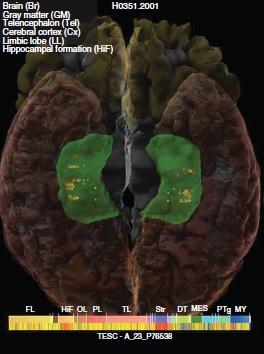Using AI to control energy for indoor agriculture
30 September 2024
Published online 3 May 2012

A global collaboration has identified several genetic variants associated with individual differences in brain size and structure. The results, reported in two papers published last week in the journal Nature Genetics, suggest that the genes might enhance or reduce the risk of several mental illness and neurodegenerative conditions including Alzheimer's disease, and could subtly influence intelligence and memory.
In the largest ever study of its kind, researchers from more than 100 research institutes — including Dennis O Mook-Kanamori at Weill Cornell Medical College–Qatar and Daniah Trabzuni at the King Faisal Specialist Hospital and Research Centre in Riyadh — used a novel crowd-sourcing approach to pool brain images and genomic data from about 21,000 people.
The researchers identified a single nucleotide polymorphism (SNP) associated with the volume of the hippocampus, a structure in the medial temporal lobe that is critical for learning and memory.
This variant, named intergenic variant rs7294919 was found to be associated with expression of the TESC gene, which encodes tescalcin, a protein known to be involved in cell proliferation and differentiation during brain development. Approximately one-fifth of the people sampled carried one copy of the variant, and this was correlated with a 1.2% reduction in hippocampal volume.
The hippocampus is known to decrease in size in people with Alzheimer's disease, depression, or temporal lobe epilepsy. These new findings suggest that the variant might be associated with increased risk of developing these conditions. Further analyses will be needed to determine whether this is the case.
The researchers also identified one SNP in the HMGA2 gene, which encodes a DNA-binding protein that might be involved in gene regulation. This correlated with larger intracranial volume, an indirect measure of overall brain size.
Those people carrying one copy of one particular HMGA2 variant, called rs10784502, had an approximately 9,000mm3 larger intracranial volume, or 0.58% of the total volume. This variant was also weakly associated with intelligence, as measured by a standardized IQ test - those carrying one copy performed slightly better on the test, by an average of 1.29 points.
Intelligence is an abstract concept that is difficult to define, let alone measure with standardized tests. Furthermore, its relationship with brain size is unclear. Nevertheless, it's known to be highly heritable and to involve multiple genes.
"Over the past decade about 20 genes implicated in IQ have been identified," says senior author Paul Thompson of the University of California, Los Angeles, "but HMGA2 is one of the strongest candidates so far."
"We're looking at other measures, such as brain connectivity, to see which genes might cause brain wiring to be altered in autism and mental illnesses. We've also put all our results online so that geneticists worldwide can search for genes they are interested in. Even since the paper came out, several groups have made discoveries using the data."
doi:10.1038/nmiddleeast.2012.66
Stay connected: